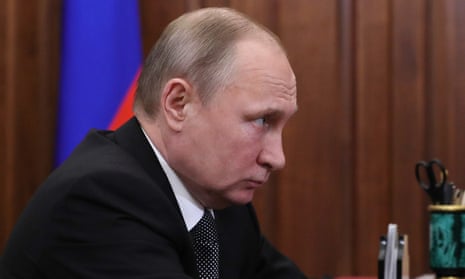The White House has confirmed that Donald Trump has raised with Vladimir Putin the possibility of a White House summit in the “not-too-distant” future.
The news of a White House invitation, first revealed by the Kremlin, came as the state department confirmed that Russia would be able to replace the diplomats the US expelled last week in response to the nerve agent attack in the UK. Both developments cast doubt on the effectiveness of what the US presented last week as a strong gesture of solidarity with the British government for the attack on the Russian ex-spy living in Salisbury, Sergei Skrypal and his daughter Yulia.
The US ordered the departure of a total of 60 diplomats suspected of being intelligence officers, as a coordinated response with UK allies around the world. Since then the Kremlin has retaliated with reciprocal expulsions. It is understood that the US will be permitted to replace the diplomats expelled by Moscow, but that arrangement does not apply to the UK. It is not clear whether any other country that carried out expulsions has a similar arrangement with the Kremlin.
The White House spokeswoman, Sarah Sanders, confirmed that Trump and Putin had discussed a meeting in a telephone conversation on 20 March, and that the White House was one possible venue, but gave no further details.
A Putin aide, Yuri Ushakov, told Russian news agencies that Trump made the offer when he called Putin to congratulate him on his election win – a call that caused controversy because Trump’s critics argued that congratulations were inappropriate for elections that few saw as being free and fair, and because of Russian aggression in Ukraine and Syria as well as Moscow’s interference in western elections.
“When our presidents spoke on phone, Trump suggested meeting at White House,” Ushakov is quoted as saying. “This is quite an interesting, positive idea.”
Asked about the invitation, the White House spokeswoman, Sarah Sanders, issued a statement saying: “As the President himself confirmed on 20 March, hours after his last call with President Putin, the two had discussed a bilateral meeting in the ‘not-too-distant future’ at a number of potential venues, including the White House. We have nothing further to add at this time.”
Ushakov said that the two governments had not had time to start planning a White House meeting before the US and other western allies expelled more than 150 Russian diplomats last week in response to Moscow’s alleged use of a nerve agent in the attempted murder of a Russian ex-spy, Sergei Skripal and his daughter Yulia, in the UK town of Salisbury.
It was the biggest ever US expulsion of alleged intelligence officials at one time, and included 48 diplomats attached to the bilateral diplomatic mission in Washington and New York, and a further 12 attached to the Russian mission to the United Nations.
Trump has not referred to the Salisbury attack or the expulsions in his recent remarks or tweets, and the state department confirmed on Monday that Russia would be able to replace the expelled officials.
“The United States has expelled 48 Russian intelligence officers, but it is not requiring the Russian bilateral mission to reduce its total number of personnel,” a state department spokesman said. “As with similar incidents in the past, the Russian government remains free to request accreditation for vacant positions in its bilateral mission. Any requests for new diplomatic accreditation will be reviewed on a case-by-case basis.”
“The Russian Federation has not informed us that it intends to reduce the total number of personnel allowed in our bilateral mission. We therefore understand that the United States may request new diplomatic personnel to fill the positions of diplomats who have been expelled.”
“Against the backdrop of these events, it’s difficult to discuss the possibility of holding a summit,” Ushakov said.
“We want to believe that the discussions [on a proposed summit] will begin,” he added. “We want to hope that … one day, at one time or another we can arrive at the start of a serious and constructive dialogue.”
